Simpsons Comics Return with Treehouse of Horror Ominous Omnibus Volume 1 - Scary Tales and Scarier Tentacles
Simpsons Comics have never had more than a paperback collection, and it's fulfilling to see the comics celebrated in such a loving way.
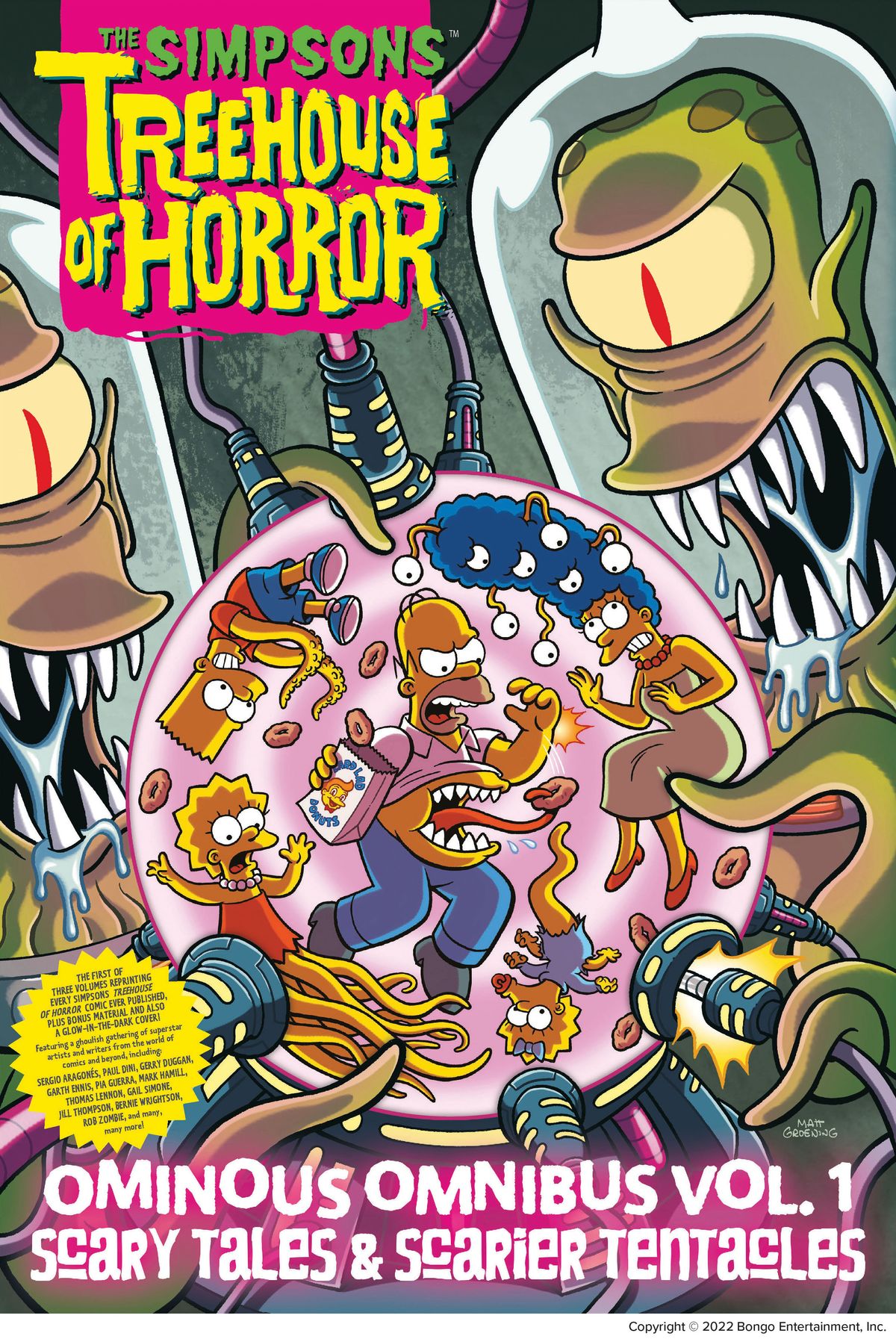
The world of Simpsons Comics occupies a rather confounding space within Comicdom. The Simpsons are one of the world’s most recognizable media franchises, yet Bongo Comics was run as a tiny independent publisher whose website often didn’t work right. The individual comics were both far better than they had any right to be yet far less commercially successful than anyone would have suspected. Fantastic writers and artists have graced the pages of Simpsons Comics. Famously, Simpsons Comics gave Gail Simone her start. Sergio Aragones created strips for the series. Creators like Mike Allred, Jim Mahfood, Evan Dorkin, and Tom Peyer have all contributed to the annual Treehouse of Horror issue. For some reason, Chuck Dixon wrote an inordinate number of issues. The yearly Free Comics Book Day was almost always the best book available that day. Single issues of Bart Simpson would make year-end lists. The issues themselves, specifically the second hundred of Simpsons Comics, were printed on a beautiful heavy matte paper stock. Over the course of 25 years, the core series, Simpsons Comics, averaged just about 10 releases a year, a fairly impressive tally. Bongo additionally published long-running Bart Simpson and Futurama series, One-Shot Wonders featuring popular supporting characters, original series like Roswell the Little Green Man, a Jimbo series through sister company Zongo, and even a seven-issue adaptation of a Coldplay album.
And then, suddenly, it was gone.
Bongo ceased publishing new issues in 2018 without much explanation why. There was plenty of speculation. The single issues never sold particularly well despite a consistently strong secondary market. Disney’s acquisition of Fox seems to be a likely culprit, but the fact that the property hasn’t been effectively re-licensed since then leads to increased speculation that the publishing rights might be a little more firmly in the grasp of Matt Groening than other types of properties. Bongo continues to operate Simpsons and Futurama apps, the exclusive digital homes for purchases of single issues from the respective properties. Bongo had been releasing back issues for app purchases in tandem every week, but the last release was close to a year ago (according to the website). Colossal Compendiums, Simpson Comics omnibi from issues 106-onward, might be out of print but still fairly well stocked. Nonetheless, there hasn’t been anything new from Bongo or Simpsons Comics in four years.

Cue Abrams Comicarts, who this week publish what I can only hope will be the first of many archival quality Simpsons comics. Specifically, Abrams brings us what is promised to be the first of three Treehouse of Horror collections in a high-quality, oversized hardback edition with a die-cut slipcase and spooky glow-in-the-dark cover that features new artwork for the edition. It’s a wonderful presentation suitable to both anchor the end of a bookshelf or display on its own. If I can be indulged for a moment, I need to point out the impressive quality of what Abrams has been producing. The design team at Abrams continues to outdo themselves. The paper stock is heavy and thick, and while it isn’t the trademark matte finish Simpsons comics had come to be known for, the glossy pages certainly make the art feel bright and vibrant.
Abrams seems to have been picking up their output, and I have to assume that their publication design plays a big part in it. Books like Noah Van Sciver's Joseph Smith and the Mormons and Fantastic Four Panel by Panel along with this Treehouse of Horror collection show the level of detail the Abrams team brings to their offerings. That level of detail is important for comics’ increasingly digital landscape. This is the type of book worth owning, worth showing off. There is no ability to replicate something like this digitally.
The collection features creators recognizable to a wide array of fans. Of course, Simpsons' mainstays Bill Morrison, Ian Boothby, and Nathan Kane all feature heavily in this collection. They are joined by some great talent from both the comics world - Evan Dorkin, Mike Allred, Sergio Aragones, Paul Dini, Geoff Darrow, Kelly Jones, and Gail Simone - and, in grand Simpsons tradition, a few celebrities - Mark Hamill, Alice Cooper, Patton Oswalt, and Lemmy Killmeister.
Somewhat disappointing is the inclusion of a Doug TenNapel story. I'd be remiss if I didn't point out that however wonderful this collection is, it is still disconcerting to think that he could be receiving even a portion of what you'd pay for the book. TenNapel's story was part of the Eisner nominated Treehouse issue from 1999, but I paged past it and onto another story.
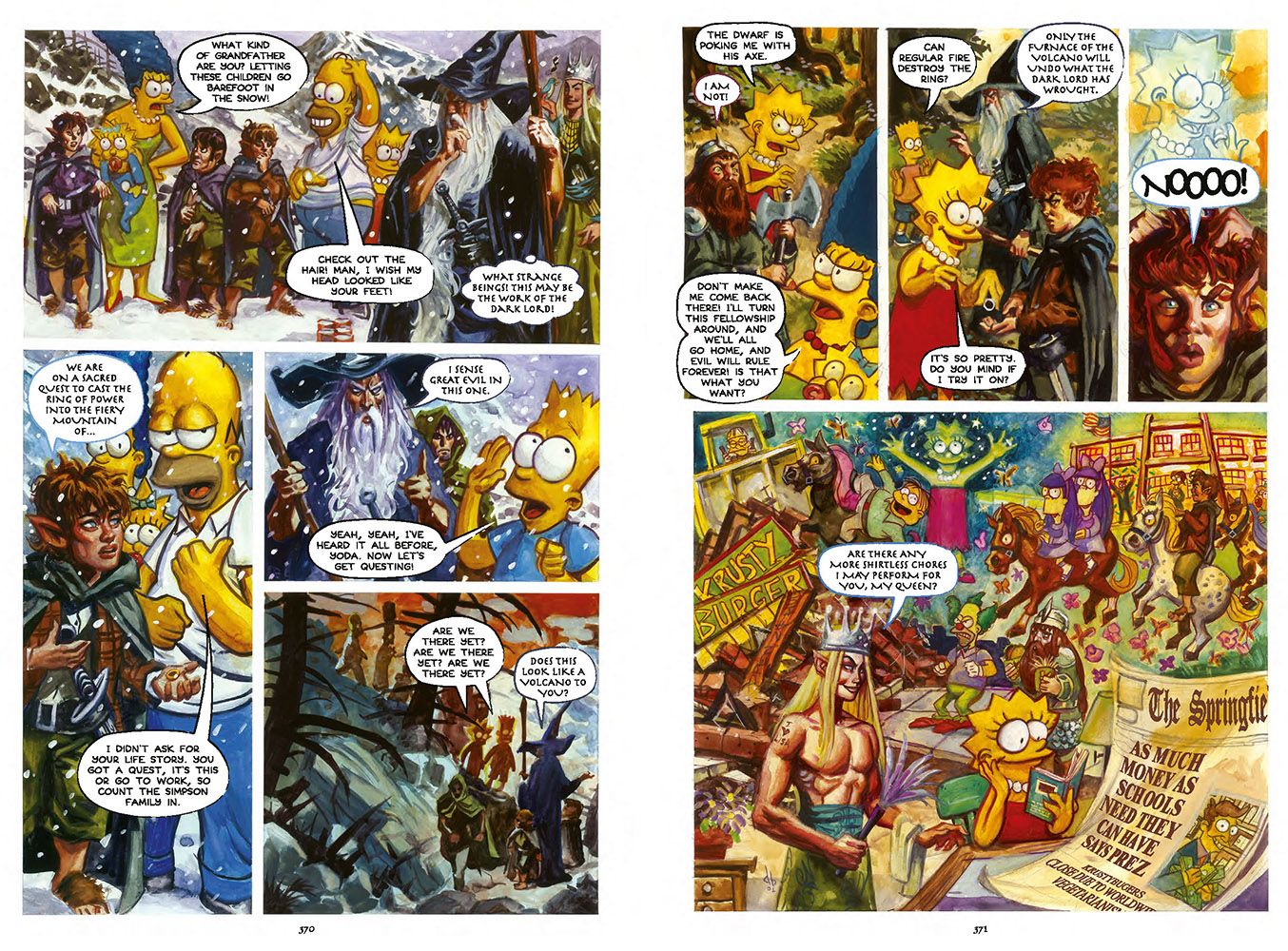
The rest of the collection is filled with fantastic stories that vary from two-page gags to twenty-page main features. Evan Dorkin writes two stories, but it’s the full-length Professor Frink escapade he draws that is a true highlight. Simpsons Comics have always had a penchant for Silver Age homages and parodies, much like the Simpsons cartoon formally incorporated a wealth of sixties and seventies pop-culture humor and references. This Treehouse collection includes a number of those fun Silver-Age winks, from the pages of paper doll cutouts to mid-century-style advertisement parodies. Mark Hamill’s excellent story lampoons Silver-Age Bizarro stories, and there is a great series of stories that combine for a solid EC homage. The other notable, and indeed very engaging component of the Treehouse issues that sets these stories apart from the core series is that the Treehouse issues often featured art that differed from the proverbial Simpsons house style that mimics the look of the cartoon. Getting a Stan Sakai version of the Simpsons, or the exaggerated look of Tone Rodriguez's interpretation is a fun way to interact with incredibly familiar characters. If Simpsons Comics ever return with new stories, I would love for them to take a page out of both their own Treehouse of Horror issues and DC's Hanna-Barbera comics to use different character designs.
What I appreciate most is the weight - physical and metaphorical - of this book. As a long-time fan of both The Simpsons cartoon and comic iterations, I'm delighted to store this book on my shelf. I never felt like Simpsons comics received their due. To me, they were consistently well-produced adaptations that both held true to the tone and vision of the cartoon while also exploring some areas the cartoon couldn't. For years, Simpsons Comics functioned as the best arbiter of the zeitgeist within Comicdom. Creators like Bill Morrison were always able to lovingly lampoon the world of comics, both contemporary and classic. For over one hundred issues, Simspons Comics were also some of the nicest-produced floppies on the stands. The matte paper stock always gave me a nostalgic feeling, and I legitimately loved the smell of a new Simpsons floppy. Their covers were thick and durable to the point that Simpsons Comics often barely squeezed into thinner comic bags. So, to be able to hold this book and feel the heft of it sends a signal about what these books meant to fans for twenty-five years. Abrams has announced that they plan to publish two more editions that will complete the Treehouse of Horror collection, and I can only hope that these collections will be successful enough to spur on additional archival editions of other Simpsons material. The three Treehouse collections will combine to include every story from the annual special and other horror-themed one-shots Bongo released over the years.
It's wise for Abrams and Bongo to begin with Treehouse collections because of the wide array of household names that have graced those issues. Treehouse comics, like their cartoon inspirations, always pushed the bar for what The Simpsons could do. I would be ecstatic if Abrams continued to produce this type of book for the core Simpsons series, and I would truly go bananas for a similar Radioactive Man collection. I mentioned above that Abrams really seems to know what they're doing with design and publishing. They have a knack for putting together the type of material that lends itself to the paper analog experience. Simpsons Comics have never had more than a paperback collection, and it's fulfilling to see the comics celebrated in such a loving way.
But wait, don't I need to perseverate on licensing deals?
If you’re paying attention, you might have noticed that Abrams seems to have licensed some material from Disney. The Simpsons are in kind of a nebulous position following the Fox purchase. And, for what it’s worth, there are no Disney markings in this book at all. The copyright page makes reference to both Bongo Comics and 20th Century Television. But, 20th is a Disney Television subsidiary.
Abrams has always had its hands in the art book game, and it’s not unique to see a third-party company publish an archival or artist edition - Dark Horse and IDW have both been famous for that. However, Abrams is not only reprinting art editions like Fantastic Four 1: Panel by Panel and collections of comics ephemera like Marvel-themed puzzle books or a celebratory accounting of Uncanny X-Men trading cards, but they are also set to publish Alex Ross’ Fantastic Four original graphic novel as well as a series of children’s books about popular Marvel characters that look to include or possible rework original art from equally popular creators.
One day, this will all make sense to me. Disney owns two legitimate publishing companies: Disney Publishing, itself a functional conglomerate perhaps best known for Hyperion Publishing, home of Rick Riordan’s Percy Jackson and all related derivations, and Lucasfilm Books, the publishing house for Star Wars material directed at YA and younger; and of course, Marvel Comics. The number of different publishing houses that produce material for the biggest media company on the planet will never cease to amaze me. I understand there are layers of media. A television studio like Paramount might produce a show that could air on ABC, despite the company being connected to other Paramount Networks like CBS or Showtime and ABC being owned by Disney. I understand that. The current count of Disney-controlled material comics licenses stands at five: Marvel Comics, Fantagraphics, Dark Horse(forthcoming), Penguin, and Abrams.
OK. I'm done.


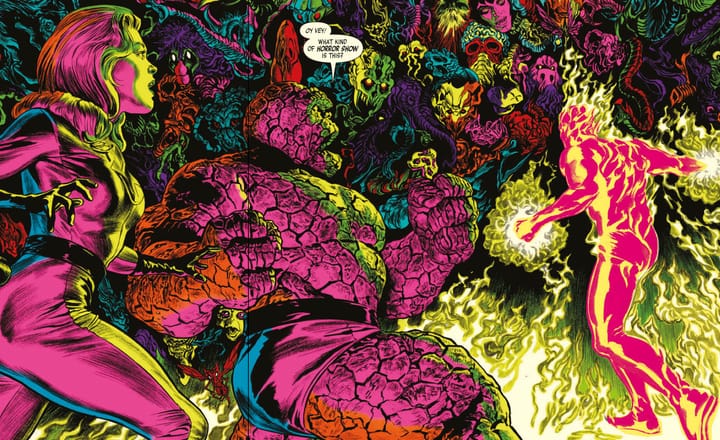
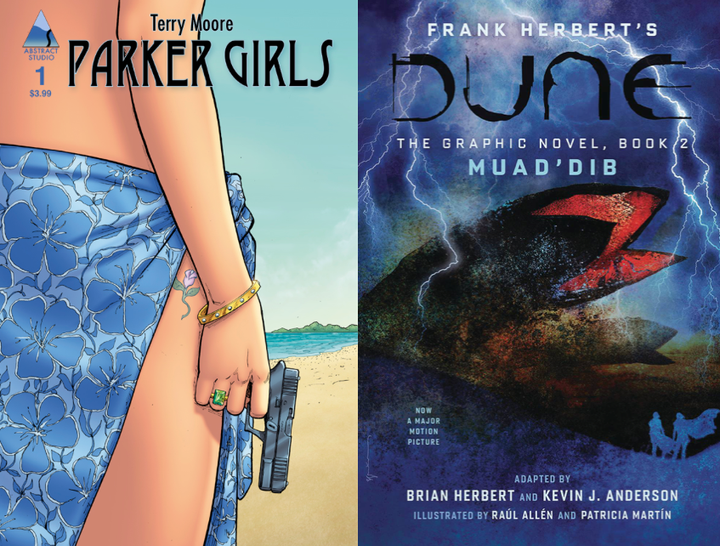
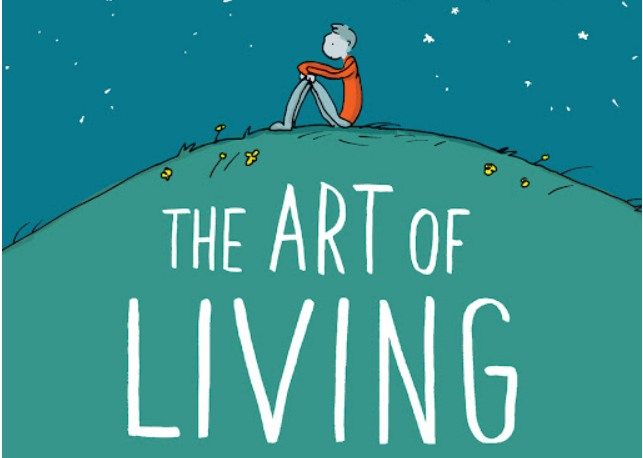
Comments ()